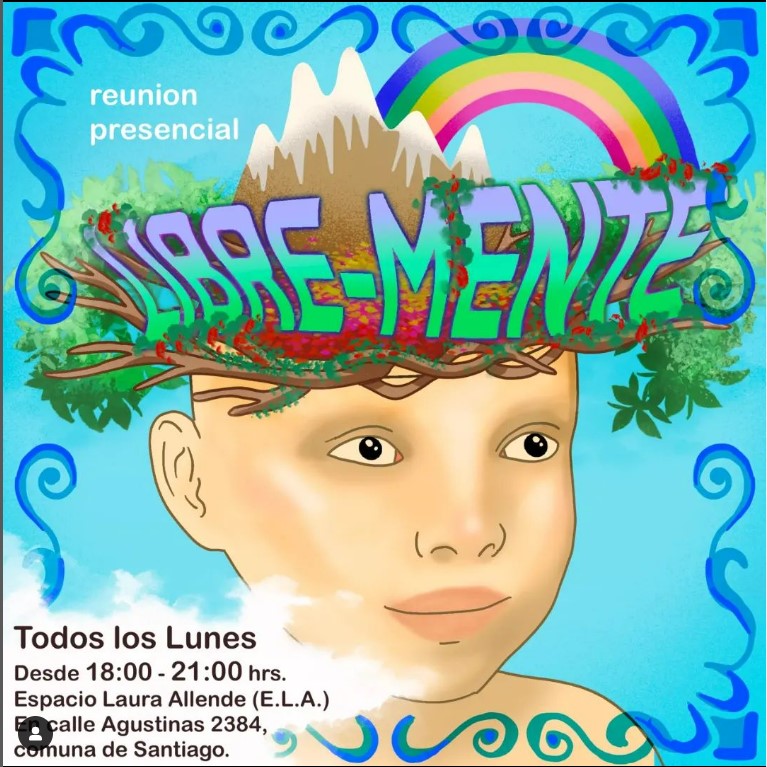Across Latin America, ‘mad pride’ in Spanish, ‘orgullo loco,’ and in Portuguese, ‘orgulho louco,‘ is growing in popularity. As mad pride grows, so too grows the field of mad studies (estudios locos, estudos locous). Chilean author Juan Carlos Cea Madrid from the Center of Mad Studies in Santiago recently published an article in the Brazilian collective health journal Physis: Revista Saúde Colectiva that outlines mad studies’ growth, frameworks and research agenda in Latin America.
The article “Latin-American Mad Studies: Conceptual Frameworks and Research Agenda” is a literature review and netnography (qualitative social media research) of mad studies and mad pride across Latin America.
“Mental health in Latin America is a complex and plural reality. The multiplicity of actors and the diversity of approaches in each region’s countries open and close possibilities in the field of knowledge. This variety of records and spaces has made it possible to challenge the biomedical hegemony in the processes of research and academic production on our continent,” Madrid writes.
“In South America specifically, a growing number of publications have described the relevance of observing the Mental Health system from the perspective of people who have received psychiatric diagnoses. By placing the experiences of people who have attended mental health services at the center, Mad Studies addresses structural concealment and systemic forgetting of relevant issues for this group. In this way, Mad Studies constitute an incipient perspective that has begun to have a place in academic discussion spaces and public debates.”

To begin, Cea Madrid explains the field of mad studies and how it relates to both epistemic injustice and politics of knowledge in psychiatry and psychology. He notes that psychiatrized and mad people have been intentionally and systemically left out of the research processes in the mental health field, and that mad studies can serve as a corrective. In his own words:
“Mad studies raises the importance of developing methodological designs that help build bridges of collaboration between academia and activism.”
Mad Studies, which arises from mad activism,” legitimizes the views, voices, and lived experiences of the epistemically marginalized and psychiatrized—actively seeking to promote shared-decision making, collaboration, collectivism, and horizontal knowledge construction across all academic disciplines on both the campus and in the clinic.
To examine how Mad Studies exists in Latin American academia, Madrid first conducted a literature review across all major databases on the continent. The literature review’s selection criteria included Spanish and Portuguese articles published over a five-year period (2015-2020). Thirty (30) academic papers were selected for the study.
The author also conducted a netnography on Facebook and Instagram to add nuance and humanity to the articles. Netnography is an ethnographic research tool that Cea Madrid utilized to observe and understand the collective organization of mad people online in Latin America. The majority of chosen collectives were country-based Chile (Autogestion Libre-mente and Locos por nuestros derechos), Mexico (Orgullo Loco Mx and SinColectivo), and Argentina (Orgullo Loco Buenos Aires). However, one regional collective was called Redsfera Latinoamericanan de la Diversidad Psicosocial (the Latin American Network of Psychosocial Diversity).
The literature review highlighted that the core tenets of mad studies are being spoken of frequently as the field evolves into a more holistic discipline. In addition, many articles emphasize and describe the importance of service users in mental health promotion and change.
Madrid offers Brazil as an example of the kinds of collaborative research that turns mad studies into praxis/pride.
“In this framework, various studies have been published about Autonomous Medication Management (GAM) in Brazil that address the narratives of mental health users about pharmacological treatment. In various Brazilian cities, GAM initiatives have led to the generation of spaces for dialogue on the use of psychotropic drugs, facilitating the participation and effective involvement of those affected in decision-making in relation to their care process. The instances of GAM have allowed it to expand the spaces of negotiation and democratic inclusion of users in their treatment….”
Moreover, the netnography revealed that alternative discourses of resistance and mad pride in Latin America begin and maintain themselves online and manifest offline with collective demonstrations. In 2015, in Santiago, the first protest against electroshock happened in May. Then only five months later, the first Mad Pride protest occurred in November. The momentum has kept going:
“Later in 2019, Mad Pride was celebrated for the first time in Buenos Aires during the month of May and in Mexico City during the month of July. These initiatives have involved the preparation of a presentation manifesto, creative slogans, and the creation of web pages and conversations open to the community reaching wide dissemination on social networks. In this way, these actions have made it possible to situate madness in the field of active citizenship based on expressions of digital activism and creative forms of collective mobilization in the public sphere.”
Overall, Madrid understands that the mad pride and mad studies movement in Latin America has been generative and continues to initiatives that push the bounds of what mad studies is and does—making it possible for academic spaces to merge into political space and incite change and movement on the street. This is, perhaps, dissimilar to mad studies and mad pride in the Global North, where mad studies are siloed into academia and stymied politically.
Madrid concludes:
“In Latin America, the participation of the users and ex-users community in research programs and the active role of the first person associative movement have laid the foundations for the emergence of Mad Studies in this territory that is closer to praxis than to academic writing.”
****
Madrid, J. C. C. (2023). Latin American Mad Studies: Conceptual Frameworks and Research Agenda. Physis: Revista de Saúde Coletiva, 32. (Link)















Such a shame that toxic concepts such as “Mad Pride” are leaking from U.S. and other Western “progressive mental health” circles into Latin America and the 3rd World, as these present themselves as revolutionary but in fact promote imperialist mentalities.
Report comment